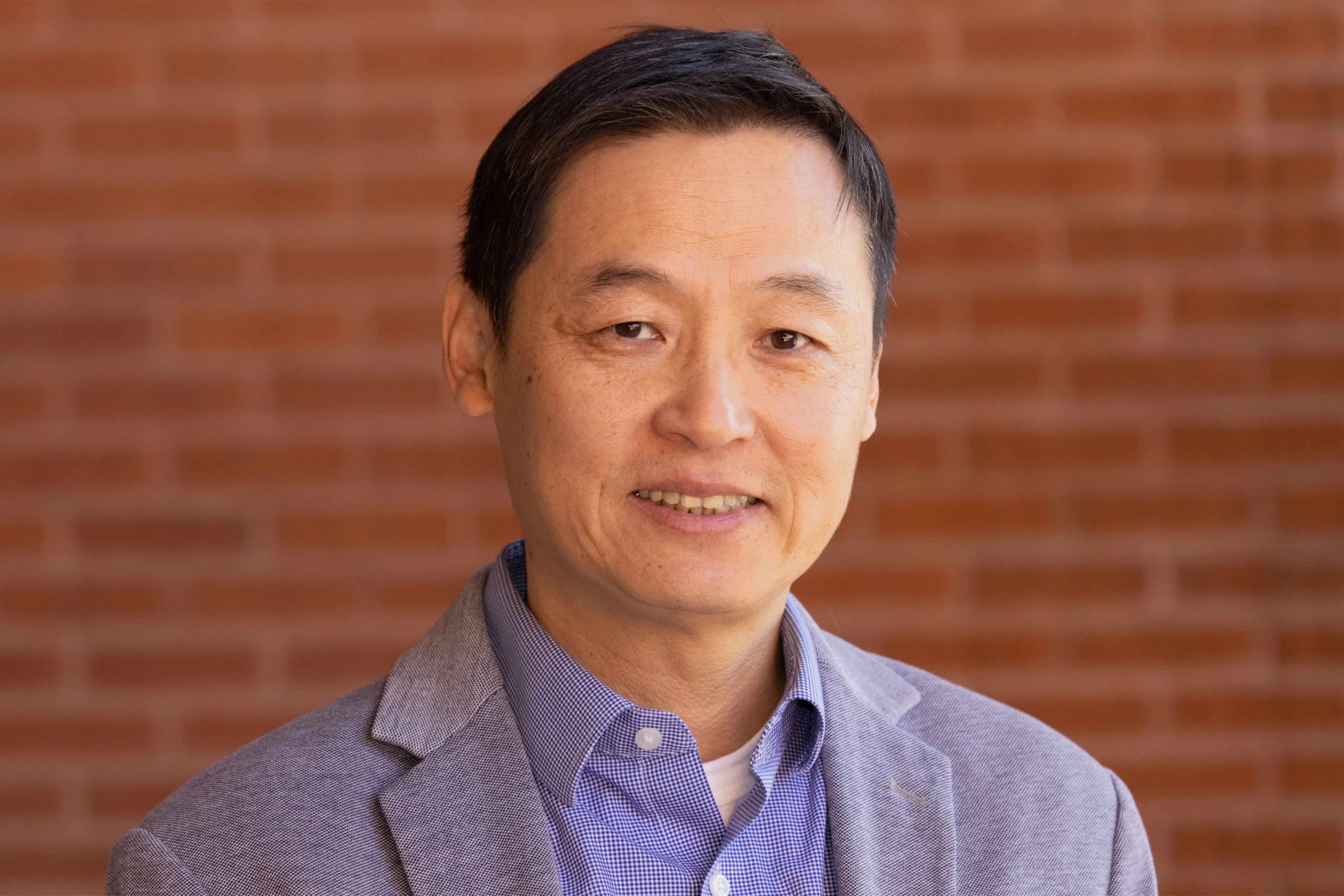
Religion of the Mind
Guggenheim fellow Jiang Wu studies Buddhist scripture through people
Matthew Morris, the fall 2023 issue of Arizona Alumni Magazine, 10-11. (https://alumni.arizona.edu/arizona-magazine/fall-2023/religion-mind).
Photo by Chris Richards.
Jiang Wu writes microhistory. The subject he most loves — the Buddhist canon, the collection of texts comprising scripture — might be abstract, he says. But through the study of individuals, he brings the world of ideas down to size. Over the centuries, he says, there have continually been human actors — Chinese, Japanese and British diplomats and historians, scholars and monks — “surrounding the canon, helping it move.”
Wu, a professor in the University of Arizona’s department of East Asian studies within the College of Humanities, wrote his book “Leaving for the Rising Sun” about the Chinese monk Yinyuan Longqi (1592-1673), who founded the Ōbaku school of Zen Buddhism in Japan after traveling to the island nation in 1654 to raise a temple.
Now, Wu will sustain his studies of the Ōbaku canon — writings, he says, that carry “modern significance” — with the support of a Guggenheim Fellowship, a $60,000 research award given to scholars and artists so that they can proceed with their work in “the freest possible conditions.”
Wu, also the founding director of the Center for Buddhist Studies on campus, calls the award “something very unique, because it’s not just supporting your projects, but it’s a recognition of your past achievement as well.”
He grew up in China, where he studied philosophy — but also thought plenty about spirituality — at Nankai University, where philosophy departments become the places to consider faith, which Wu says is not about worship or superstition but rather “people’s inner world.”
He accesses that interiority through microhistory, the attempt to reconstruct a person’s life and thoughts. Such an effort means poring over archival documents — for instance, the detailed diaries of Japanese delegates to Britain and the United States in 1871 and 1872, after Japan’s military government, or shogunate, fell during the Meiji Restoration.
The delegates, upon returning to Japan in 1873, sent a copy of the Ōbaku canon to the British Empire’s Indian Office Library, where scholar Samuel Beal was tasked with completing the first English catalog of East Asian Buddhist scriptures. His cataloging methods, Wu says, influenced the Taishō Buddhist canon compiled in 1930s Japan. Today, the Taishō canon reigns.
“We’re talking about a process starting from the Ōbaku canon until the creation of the standard canon,” Wu says of his Guggenheim-supported project, “Scripture and Modernity: The Ōbaku Buddhist Canon in East Asia and the West.” Among other places, the work will take him to the British National Archives, and, with students, he will visit Yinyuan’s Manpukuji Temple in Uji, Kyoto prefecture, to view the carved wooden blocks used to record Buddhist scripture in brushed ink.
“I want to trace this transformation, and this transformation happened in the modern time,” he says. “So, then you have an interesting clash of culture, of course, but also assimilation and diplomatic tensions.”
Wu cares about the inner life in part because he believes that the world is driven by ideas, which underlie not only spirituality but also science and technology. Change, as he sees it, comes from the mind.
Buddhism, he says, is “a religion about the mind.” It tries to “tackle the issue of the mind,” asking its practitioners to “go inside,” including through meditation. The faith’s contemplative aspect, he says, makes it popular today, when anxiety, depression and stress afflict many.
Because of the connections between Buddhist practices and health — both mental health and physical health, as the faith promotes vegetarianism — Wu’s Center for Buddhist Studies has collaborated with UArizona’s Andrew Weil Center for Integrative Medicine. Wu says that the Buddhist studies center, established in 2017, is meant to be “a connector,” and not only with Weil.
In this spirit, he thanks the individuals and groups at and beyond the university who have pushed him and the center forward, including his home department and college, Weil himself, and the John Simon Guggenheim Memorial Foundation.
Neither Wu nor the center is done, he says. With his funding, he’ll write a book, taking the spring semester off from teaching.
As for the center, he says, “Our goal is to help to enhance our consciousness in the way we do the common good.”

